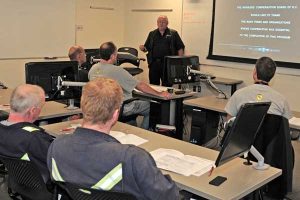Company facilitates training for marine industry
By Lookout on Sep 23, 2013 with Comments 0

Instructor David Rogers from BC Hazmat Management Ltd. teaches a Workplace Hazardous Materials Information System (WHMIS) course to employees of Seaspan.
A retired naval captain is changing the way marine industrial training is done in British Columbia.
Capt(N) (Ret’d) Alex Rueben best known for leading Fleet Maintenance Facility Cape Breton and serving as MARPAC Chief of Staff, is the Executive Director of the Industrial Marine Training and Research Centre (IMTARC).
Last February, the doors to his organization opened in a modest one-story building on the outskirts of Naden.
For the first time in B.C. marine history, there is a centralized, specialized facility for marine industrial workplace training, research and development.
“Before, many industrial marine employers worked out their own isolated solutions to training their workforces, if they could afford it or made it a priority. In the case of the smaller employers, the training was often unaffordable. Now, IMTARC makes the training affordable and brings the industry together in the classroom where they learn as much from each other as from the curriculum being taught,” explains Rueben.
The facility features two classrooms with a 24 student capacity, and a 12-person computer lab with one-touch projection systems and networks that allow direct conference calling to classrooms across the country.
“Some of our clients are large organizations with operations in several locations so they need to be connected,” says Rueben. “This lets them offer the same level and fidelity of training to multiple classrooms at the same time.”
IMTARC serves the needs of marine industrial organizations by brokering training provided by private and public training service providers, leasing out the learning facilities, and developing new curriculum for topics such as ship repair industry entry level training (pre-employment course), industrial marine estimating, industrial marine planning and scheduling, industrial marine terminology, and various leadership courses focused on industrial working environment.
“The more streamlined, relevant, and proximate the training program is, the more effective it is for the company.”
IMTARC has also branched into research and development of marine industrial technologies, working with post secondary institutions and high tech industry to bring innovation and enhanced productivity to the shipbuilding and ship repair industry. “Things like laser welding, the use of composite materials, or the use of liquefied natural gas for marine propulsion are the kind of things we’re interested in,” says Rueben. “This is an interesting time for these kinds of technology and it’s going to lead to some significant advances for the marine industry.”
They are also working with the B.C. government to help innovative small and medium enterprises introduce their products into the supply chain.
“There are a lot of companies putting out great products, but it can be difficult for them to get the qualifications and certifications they need to break into the market,” says Rueben. “We hope to put a learning and enabling framework into place that will allow these companies to compete effectively in the supply chain and work in partnership with larger companies to meet the needs of the marine industry.”
With less than a year of operation, Rueben says the future of the organization is bright, as is the future of the marine industry.
“We’re proud of the work we do here. Hopefully, with time, we’ll help make the B.C. marine industry not only a nationally competitive industry but also a player in the global marketplace.”
-Shawn O’Hara, Staff Writer
Filed Under: Top Stories
About the Author:





